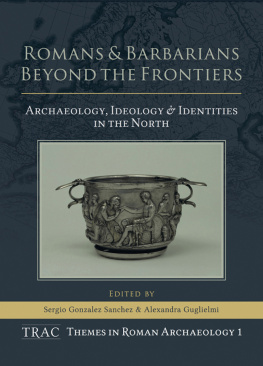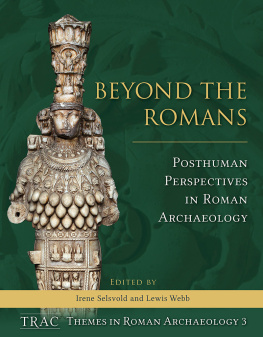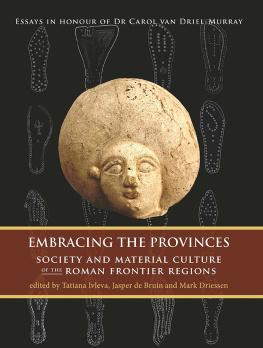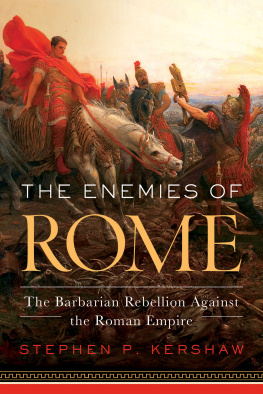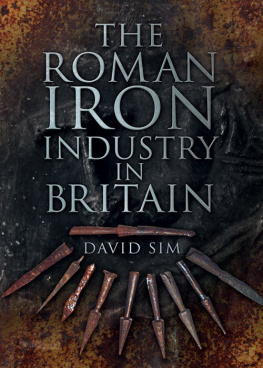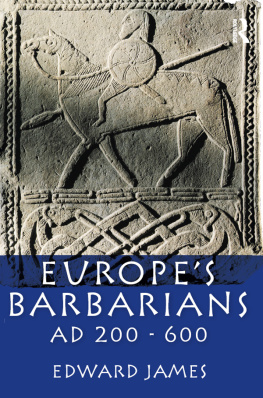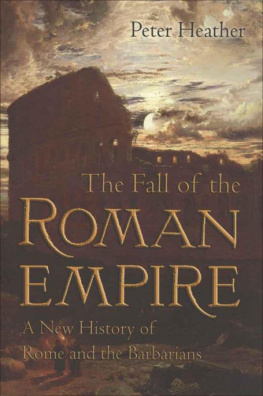
ROMANS AND BARBARIANS BEYOND THE FRONTIERS
Archaeology, Ideology and Identities in the North
ROMANS AND BARBARIANS BEYOND THE FRONTIERS
ARCHAEOLOGY, IDEOLOGY AND IDENTITIES IN THE NORTH
Edited by
Sergio Gonzlez Snchez and Alexandra Guglielmi
TRAC THEMES IN ROMAN ARCHAEOLOGY
VOLUME 1
Series Editor: Darrell Rohl
Published in the United Kingdom in 2017 by
OXBOW BOOKS
The Old Music Hall, 106108 Cowley Road, Oxford OX4 1JE
and in the United States by
OXBOW BOOKS
1950 Lawrence Road, Havertown, PA 19083
Oxbow Books and the individual authors 2017
Hardcover Edition: ISBN 978-1-78570-604-2
Digital Edition: ISBN 978-1-78570-605-9 (epub)
Mobi Edition: ISBN 978-1-78570-606-6 (mobi)
A CIP record for this book is available from the British Library and the Library of Congress
All rights reserved. No part of this book may be reproduced or transmitted in any form or by any means, electronic or mechanical including photocopying, recording or by any information storage and retrieval system, without permission from the publisher in writing.
For a complete list of Oxbow titles, please contact:
UNITED KINGDOM
Oxbow Books
Telephone (01865) 241249, Fax (01865) 794449
Email:
www.oxbowbooks.com
UNITED STATES OF AMERICA
Oxbow Books
Telephone (800) 791-9354, Fax (610) 853-9146
Email:
www.casemateacademic.com/oxbow
Oxbow Books is part of the Casemate Group
Front cover: Section of one of the two Hoby cups, Greek-inspired Roman silver cups (early first century AD) found in a princely grave in Hoby (Denmark), and now on display in the National Museum of Denmark, in Copenhagen. Nationalmuseet, Digital Collections.
Series Foreword
Darrell J. Rohl
This book underscores a massive shift in the scope and scale of the organisation behind the Theoretical Roman Archaeology Conference, more familiarly known as TRAC. It is the first volume in a new publication series of high quality monographs and thematic edited volumes that are curated by the TRAC Standing Committee and undergo rigorous peer review by members of TRACs new Advisory Panel and other recognised subject specialists. The series, titled TRAC Themes in Roman Archaeology , expands TRACs publication initiatives just as the new TRAC Workshops have moved the organisations offered events beyond that of its flagship annual conference. After more than 25 years, TRAC remains on the move and the current shift reflects the Standing Committees responsiveness to internal and external critiques, but also a heightened sense of purpose, responsibility, organisational confidence, and ambition. I know this because I led the TRAC Standing Committee for almost six years and worked with others to help bring about various aspects of this shift, including this new series.
The series vision is to leverage TRACs role as the leading venue for new ideas and theoretical developments within Roman Archaeology in order to offer an attractive and worldleading opportunity for both new and established scholars to publish theoretically-informed research on problems, themes, and emergent issues within the archaeology of the Roman world. Unlike the existing TRAC Proceedings , which offer an often random collection of papers presented at TRACs annual conference, each volume in this series will focus on a particular theme, problem, or theoretical perspective, and contributions need not have been presented at a TRAC conference or other TRAC-branded events. Volumes may be single-authored, co-authored, or an edited collection of papers, but each must be relevant, critically engage with theory, and offer a high level of research excellence. In short, no matter what stage of your career, the TRAC Themes in Roman Archaeology Series is intended to be the go-to venue for publishing excellent book-length manuscripts and thematically-coherent collections of papers that demonstrate a commitment to the role of theory in Roman-period archaeological research. TRAC is uniquely positioned to facilitate this.
As the initiator of this new publication series, I am delighted to see it come to fruition and would like to offer my own acknowledgements. Particular thanks is owed to Dr Ian Marshman (former TRAC Standing Committee Vice Chair) and Clare Litt (Casemate Group/Oxbow Books) for helping to flesh out the series vision and format. Former TRAC Standing Committee members Dr Tom Brindle, Dr Stefan Krmnicek, and Dr Jason Lundock are thanked for supporting this initiative in its formative stages. I also thank the current volumes editors, Dr Sergio Gonzalez Sanchez and Alexandra Guglielmi, for enthusiastically proposing and putting together this inaugural volume, and the individual authors and anonymous reviewers for their crucial contributions. The current Standing Committee (Matthew J. Mandich, Dr Lisa Lodwick, Dr Sergio Gonzalez Sanchez, and Thomas J. Derrick) has been responsible for overseeing the final details of making this series a reality and its members are owed much gratitude. Going forward, the series will be edited by an editorial board comprised of the elected Standing Committee members. While my tenure on the TRAC Standing Committee has come to an end, I am confident that TRAC along with its events and publications is in good and capable hands. I look forward to future volumes within this promising new series.
Canterbury Christ Church University
27 August 2016
Preface: Towards New Frontiers and Beyond
Sergio Gonzlez Snchez and Alexandra Guglielmi
Roman imperialism, and the way in which the peoples of the Roman Empire interacted (militarily, culturally, economically, or otherwise) with the barbarian peoples they encountered as a result of their territorial expansion, have been some of the most discussed topics in Roman archaeology for the last three decades, especially from a theoretical perspective. As is expected, the consequences of Roman imperialism and those associated interaction processes were not limited to Roman provinces, or even to the frontiers of the Empire, but affected and involved territories and peoples far beyond its limits. While provincial Roman archaeology and frontier studies have traditionally been the focus among Romanists, beyond-the-frontier studies have recently developed as a sub-discipline in their own right. North-western Europe has been at the epicentre of this surge in interest, and because of this, the region has become a perfect laboratory for testing new theories, concepts, and approaches to this topic, as it encompasses territories that, in antiquity, both fell within, as well as far beyond the limits of the Empire. Today, these territories are host to several individual nations, each with particular academic traditions and theoretical and practical approaches to their Roman past.
Much has changed in Roman archaeology over the last few decades, especially concerning the way we think about the past, and the changes and developments in how we conceptualise our socio-cultural context have been echoed in archaeological theory. A relevant example is the evolution of approaches to the topic of Roman imperialism, cultural change within the boundaries of Empire, and interactions with the peoples beyond them. From a model based on a uniform discourse around the paradigm of Romanisation, interpretative frameworks have moved on. A Romano-centric perspective, which revolved around the transfer of civilised culture from Rome to the less civilised barbarian groups, and an approach focused on the influence of Romanitas on barbarian identities highlighted at the expense of overlooking the importance of Barbarian elements in the development of Roman identity have been abandoned not without resistance and replaced by a fragmentation of theoretical approaches. This is mainly the result at least in the case of British archaeology of the advent of Post-Processual Archaeology and the introduction of Post-colonial theories. This fragmentation is as challenging as it is exciting, and a comparative multinational/multiregional approach is a promising way to tackle these issues holistically, without falling prey to regional particularities. In that way, we make it relevant to the study of the Roman Empire as a whole, including those areas of influence beyond its territorial frontiers.
Next page
